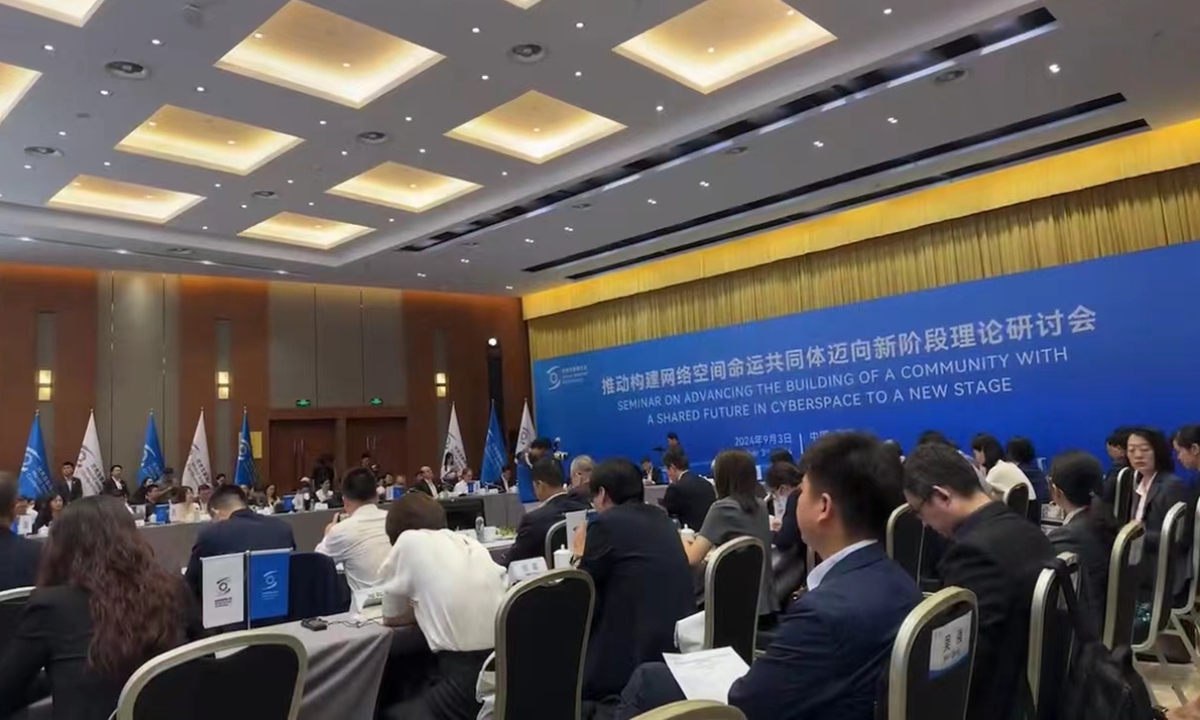China plays greater role in global cyberspace governance, narrowing tech gap among countries: scholars

Scholars from China, South Korea, the UK, and Australia discuss how China's proposal to build a community of shared future in cyberspace has contributed to global cyberspace governance at a seminar themed around Advancing the Building of a Community With a Shared Future in Cyberspace to a New Stage. Photo: Liu Caiyu/GT
China is actively taking responsibility in addressing the challenges of cyberspace governance, playing a crucial role in narrowing the technological gap among countries, scholars attending a seminar in Beijing said on Tuesday.
David Gosset, the French scholar and founder of the China-Europe-America Global Initiative, shared his views during a seminar themed around Advancing the Building of a Community With a Shared Future in Cyberspace to a New Stage.
Scholars from China, South Korea, the UK, and Australia discussed how China's proposal to build a community of shared future in cyberspace has contributed to global cyberspace governance.
The Internet offers progress and happiness to people, but incidents such as invasion of personal privacy, infringement of intellectual property rights, and cybercrime occur from time to time in cyberspace, Li Junru, former vice president of the Party School of the Central Committee of the Communist Party of China, told the seminar.
Cyberspace surveillance, cyberattacks, and cyber terrorism have become global public nuisances, Li said.
Meanwhile, some countries arbitrarily draw lines based on ideology, introducing political ideas and values into cyberspace, exacerbating politicization and factional confrontation, causing serious division in the international community, Xu Bu, a senior research fellow, and member from the United Nations Secretary-General's High-Level Advisory Board on Effective Multilateralism, said.
"Is the world cyberspace owned by the 5.3 billion global netizens, or by a few who create opposition and division? …I believed that the concept of building of a community of shared future in cyberspace brings new hope to a turbulent and changing world," Li noted.
Over the past decade, the concept has been widely welcomed and actively responded to by the international community. From conceptual documents to action initiatives, and then to practical cases, the consensus has been continuously translated into concrete actions, Xu added.
It leads global governance cooperation in cyberspace, promotes fairness and justice, also upholds the legitimate rights and interests of developing countries around the world. Besides, the concept establishes international communication bridges in cyberspace and promote the establishment of a multilateral, democratic, and just international internet governance system, Xu noted.
The world is particularly looking to China to play a more prominent role in maintaining a more united global cyberspace governance, Kilnam Chon, Professor Emeritus of Korea Advanced Institute of Science and Technology, known as "Father of Internet in South Korea," told the Global Times.
Gosset told the Global Times that China plays a role in connecting the North and the South, as well as the South and the South. It supports the United Nations in its central and coordinating role, and is strengthening international cooperation in building artificial intelligence capabilities.
"China is acting with responsibility. China is bringing new ideas, and I think this idea of building of a community of shared future in cyberspace is very, very, very important. It advocates cooperation," Gosset said.
Like-minded individuals should collaborate and share information rather than fostering discord, David W. Ferguson, Honorary Chief English Editor of Foreign Language Press told the seminar.
He noted that the modern audience is increasingly receptive to China's positive story-telling, citing the success of "Black Myth: Wukong" as an example. This online game, adapted from one of the four classics of Chinese literature, has become a massive hit among millions of young people worldwide.





